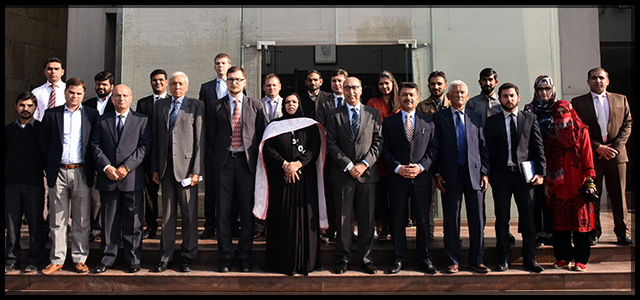 Islamabad, 20th November, 2017: The Centre for Pakistan and Gulf Studies (CPGS) organised a roundtable conference on “Shifting Strategic Landscape of South Asia: The Role of the Shanghai Cooperation Organisation” held at the Pakistan Institute of Parliamentary Services on 20th November, 2017. Speakers at the event included Ambassador (R) Abdul Basit, President of the Islamabad Policy Research Institute (IPRI) and as well as Dr Petr Topychkanov from the Carnegie Moscow Center.
Islamabad, 20th November, 2017: The Centre for Pakistan and Gulf Studies (CPGS) organised a roundtable conference on “Shifting Strategic Landscape of South Asia: The Role of the Shanghai Cooperation Organisation” held at the Pakistan Institute of Parliamentary Services on 20th November, 2017. Speakers at the event included Ambassador (R) Abdul Basit, President of the Islamabad Policy Research Institute (IPRI) and as well as Dr Petr Topychkanov from the Carnegie Moscow Center.
The discussion revolved around the situation in Afghanistan, the impact of the increasing Indian role in the region, an overview of the Pakistan-Russia relations historically, the repercussions of the Nuclear Suppliers Group (NSG) waiver to India as well as the future role of the SCO with regard to establishing peace in Afghanistan.
In her opening remarks, President CPGS Senator Sehar Kamran (TI) said the Asian region was going through a mega-transformation that stood at a precarious crossroads. She highlighted recent developments which will have a significant impact on the strategic landscape of the South region, such as the President Trump’s new South Asia Policy and the United States’ declaration of retrenchment after over 16 years of presence in Afghanistan describing it as unnecessary flexing of military muscles, which will only undo much that has been achieved over many years diplomatically. In addition to further antagonizing regional countries like Pakistan, China & Russia. She added that the China Pakistan Economic Corridor (CPEC) is, on the other hand presented an invaluable opportunity, which regional countries, especially Afghanistan, could utilize for their benefit of their economies and their peoples.
While talking about the positive developments, especially in the context of Pakistan and the Russian Federation, she said we are moving into a new era of cooperative relations, based on mutual respect and equality. In addition to the alliance with China, strengthening collaboration with Russia has the potential to move the entire region into a more positive direction. In this regard, she added that the SCO offers a multilateral platform where both Pakistan and India will have opportunities to participate in regional cohesion and development. She remarked that China and Russia could play a constructive role in creating an enabling environment for stabilizing the region and as well facilitating the peace process in Afghanistan.
Ambassador (R) Abdul Basit in his speech said the region of South Asia is in the midst of paradoxical development. He said Afghanistan is the biggest challenge for our foreign policy. Pakistan’s approach has always been to establish peace in the region, but our efforts have not been reciprocated, repeatedly. In the context of the SCO, he said that Pakistan and India will attend the SCO Summit for the first time as full members, whenever the next session will be held and it would be interesting to note how that dynamic develops.
Dr Petr Topychkanov, in his presentation gave a historic overview of Pakistan-Russian relations. He said that it is vital to understand the shift that is underway in South Asia; the increasing strategic relationship between India and United States and the growing economic and political cooperation between China and Pakistan under the umbrella of CPEC. He remarked that the International community holds a different view towards CPEC; although it is apparently based upon economic aspects, but there are assumptions that it has a military and naval component as well. He highlighted that despite the fact the US signed a nuclear deal with India and helped in granting a NSG waiver, but the US still failed to establish nuclear power plants in India. On the SCO, he said the organization gives an opportunity to discuss broader regional and global strategic and security issues in a multilateral setting, but it was not forum to discuss bilateral issues. The solution to the Afghanistan problem lies within the region not outside of it, he added.


